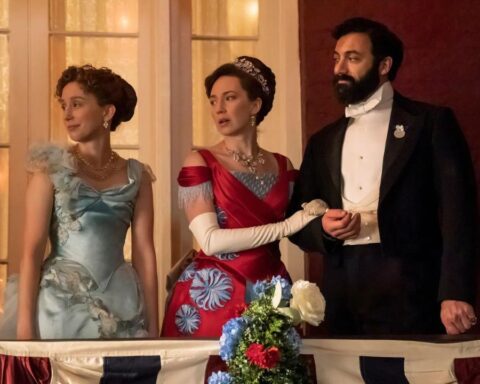Acapulco, which is very (emphasis on the “very”) loosely based on Ken Marino’s How to Be a Latin Lover, tells the story of the twenty-something Máximo Gallardo (Enrique Arrizon), who grows up dreaming of working at the hottest resort on the Pacific coast, Las Colinas. When he eventually lands that job of a lifetime, Maximo soon discovers that being a cabana boy is a lot more complicated than he ever imagined, as he spends his days and nights trying to navigate the eccentric demands of hotel guests, the sage like advice of his mercurial mentor, and a complicated home life, all while staying true to his own upbringing and principles.
The coming-of-age sitcom, set both in the present day and in the 1980s, tells this story through a series of flashbacks that are narrated by the legendary Eugenio Derbez, who plays the older Máximo, reprising the role that he originated in the 2017 movie.
Umapagan Ampikaipakan: I left the first episode of Acapulco wanting more. Which is always a sign that a series is doing something right. In this case, it was just how completely immersive everything felt. The world of Las Colinas is so very appealing. The oversaturated colours. The flamboyance of its guests. The escape that it offers is such a welcome trope in this era of quarantines and lockdowns.
This is the third “resort” series we’ve had in as many months. The White Lotus and Nine Perfect Strangers used the idea of that “escape to paradise” as a metaphor to explore the darker side of humanity. Acapulco, on the other hand, is a far more wholesome effort that is rooted instead in memory and nostalgia.
Bahir Yeusuff: All without ever coming across as pandering, or apologetic, or in any way subservient. I get it. The fact that there is a massive resort in Mexico that is owned by and caters to (mostly) white, (mostly) rich North Americans isn’t great. But they’re telling a different story here. One that reappropriates that moment and uses it to relate a Mexican success story. Because, spoiler, Máximo ends up being very successful.
There is so much here to enjoy that I too just wanted to binge through this whole thing in one sitting. But I didn’t. And neither should you. Like a great fine dining experience, these episodes, like all Apple TV Plus shows, are released weekly. Acapulco feels like a throwback to a different time. Where there is less snark in the writing and in its execution. There is no need for things to be gritty here. The pinks are pink, the blues are the best blues that the 80s can give you, and it all works so wonderfully well.
Acapulco really sets a mood. This is a comedy. There is a great introduction to the entire story as told by the older Máximo that sets up the entire series so wonderfully. It’s one part rose tinted glasses and one part exaggeration. I was all in from the get go.
Going Loco Down in Acapulco

UA: All of the character dynamics in this series are so beautifully written. The relationships between Máximo and his best friend, between his mum and sister, and between the staff at Las Colinas are all witty and smart, culturally astute, and full of heart.
My favourite dynamic however is between two characters that don’t share even a second of screen time. It’s the one between younger Máximo and older Máximo. I love how both Arrizon and Derbez channel that same character. Derbez has seen and done it all, and plays it cool, while Arrizon imbues his performance with a constant sense of wide-eyed wonder and curiosity. It makes perfect sense that one grows up to be the other. You can see how the character has matured over the years, but both actors still maintain that welcoming charisma that makes Máximo, Máximo.
BY: That is a great observation. I didn’t even think of that. And you’re right about young Máximo’s wonderment. There is a glint in everything he sees. He isn’t fawning over the American girls in bikinis lounging at the pool. He’s fawning at everything that is happening at the pool. He’s enthralled by this magical place where the rich come to play and the little part that he gets to play in all of it. There is just a purity – which I know is a weird sentiment when talking about a resort hotel in Acapulco – but that sense of wonder is really quite refreshing to see.
There is so much that is great about this series. But I especially love the Mexican covers of all my favorite 80s pop radio hits by the two singers serenading by the pool. I want this soundtrack on repeat.
UA: Purity. That is a spot on description as to how Acapulco is framed. It is why we continue to root for Máximo, even when he starts bending the truth and trying to justify some of his more questionable choices. We know from the moment we meet his older self that the road to such riches must have come with some compromises, and the reason we still empathise with the character is because each and every one of the ethical dilemmas he faces is used to develop his humanity.
Whether it’s a lie to help get his mother the spectacles she so desperately needs, or his sacrificing of an object with great personal value in order to cater to the needs of yet another entitled American tourist, every one of those interactions tells us something new and something interesting about the character.
The Magic Down There Is So Strong

BY: As great as it is to watch Eugenio Derbez, the show really is carried by Enrique Arrizon as the younger Máximo. With every new episode I always think that I want to see more of Derbez, but as soon as we go back to Arrizon I am immediately sucked in. It could be the setting of his portion of the story, but Arrizon is absolutely electric to watch. That sense of wonder you were referring to never comes off as fake or annoying. It feels so natural and in tune with how a kid from the lower rungs of society might feel when first experiencing Las Colinas.
Also, I get that this isn’t how a real resort is run, but neither is Ted Lasso accurate in its portrayal of a football team. These shows aren’t trying to be real in the way ER might showcase a hospital. Ted Lasso and Acapulco are the Scrubs version of reality. Which is fine. I mean, realism is great, but there is something to be said about being escapist too.
UA: Like Ted Lasso, Acapulco is also a series that focuses on the bond between Máximo and those around him. The overarching narrative here plays second fiddle to the individual stories of these characters. We’re invested in their lives as opposed to the plot. Which is also why we keep coming back for more. It’s the opposite of the telenovela, where drama, conflict, and cliffhangers drive our commitment. In shows like Acapulco and Ted Lasso, it is more about wanting to spend some time with these people who have suddenly become a part of our everyday. We like them. We enjoy their company. We are excited to see where their lives take them.
Leaving Broken Hearts All Over Town

BY: There’s also something to be said about the way Acapulco addresses the language being spoken on the show. It is about 50-50 Spanish and English, and the way that has been written in is so natural and organic to the story. As worldly and well travelled consumers of media, you aren’t as afraid of that two inch wall known as the subtitle, but it apparently really is a problem for American audiences. And in Acapulco, instead of just making everyone speak English, that switch is baked into the story of an 80s holiday resort. It seems small, but that attention to detail and thought is something I truly appreciate. It makes the story a lot more natural and doesn’t require a dumbing down of the audience.
UA: Even the whole “sit down young man, let me tell you a story” trope isn’t dumbed down. The writers play with it, leaning into the idea of (older) Máximo being an unreliable narrator, and using it to their advantage. They know that we’ve seen this sort of thing hundreds of times before and don’t just give us the same old same old. By having him tell this story to his nephew, Hugo, they exploit that interaction to constantly subvert our expectations. It’s another very clever way to shake up an old idea.
BY: Very early on, Hugo calls out Máximo on how his mother is portrayed in his retelling, solidifying the idea that while this story we’re watching may be true, it may not entirely be accurate. Once again, that simple moment gave this trope of an older man telling his life story to a younger relative a small but nice twist.
UA: Also like Ted Lasso, I have a sense that people are going to be speaking about Acapulco in terms of how the show makes them feel. Yes, the show is very clever in its execution. It’s funny. It’s got heart. But most of all, I like it as much as I do because it makes me feel good. It reminds me that there are good things in this world. It kinda restores my faith in humanity.
BY: For me it’s a nice distraction. For 30 minutes a week I get to go away to sunny Acapulco and watch a story about a high end resort filled with nice people and great Spanish covers of 80s pop hits. What a great way to start the weekend.









Follow Us